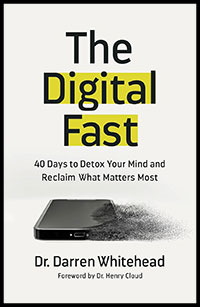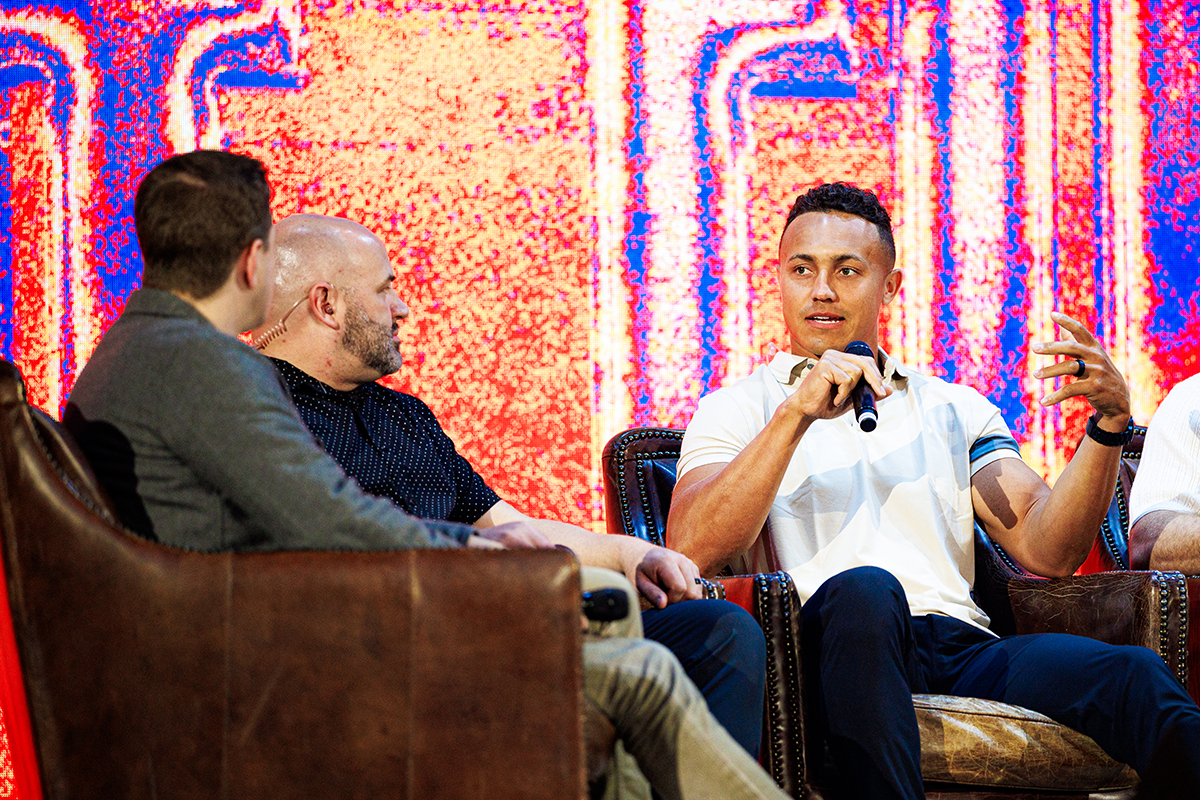Search News Archives
Filter News Articles
Additional Navigation
Liberty students choose to embark on 28-day digital fast in February
January 31, 2025 : By Ryan Klinker - Office of Communications & Public Engagement

Spurred by a message from pastor and author Darren Whitehead in Friday morning’s Convocation, many students at Liberty University have decided to collectively spend the month of February free from the endless streams of social media notifications and to limit other forms of smartphone stimuli. Using Whitehead’s book “The Digital Fast,” Liberty’s Office of Spiritual Development is using Campus Community and the residence hall community groups to encourage students to follow the 28-day fast to experience the benefits of spending their time and energy elsewhere.
Whitehead is the founder and pastor of Church of the City, which has multiple locations in Nashville, Tenn.
In a pre-recorded video played before Whitehead took the Vines Center stage, Liberty President Dondi E. Costin, Chancellor Jonathan Falwell, and Vice President of Spiritual Development Josh Rutledge spoke about their support of the idea of reclaiming life from smartphones’ control.
“John 10:10 tells us that the thief comes to steal and to kill and to destroy. There’s no doubt, no question, that Satan has figured out that if he can steal our time that he can kill our mission; that he can possibly destroy our faith,” Falwell said. “It’s important that we recognize that while we have lots of great technology that can help us do what we do, we have to make sure that it doesn’t control us; rather, that we control it.”
The smartphone is the fastest adopted piece of technology in human history, Whitehead said, and he noted that 92 percent of Americans (as of 2024) are carrying a smartphone with them today. Citing Romans 12:2, which tells Christians not to be conformed to the world, Whitehead stated: “There has never been another piece of technology in all of history that has been more effective at conforming people to the world than the smartphone.”
Around 97 percent of today’s college students have a smartphone, and Whitehead cited a study that showed they spend eight to 10 hours on it every day. If a typical day is comprised of 16 waking hours, that would mean half of a day revolves around a device. By deleting the “distraction apps” — like social media, games, news, video streaming, and shopping — he said participants will see a difference in their lives.
“We are not anti-technology. We are not suggesting you throw away your smartphone. We are not suggesting you do a digital fast for the rest of your life. We are not suggesting you abandon your responsibilities for 28 days,” Whitehead said. “We are suggesting that you take 28 days to self-observe what happens… when we intentionally reduce the noise, the distractions, the notifications, the constant buzzing in the pocket. What will happen for you? What will happen to your perspective, your friendships, your spiritual life?”
“I believe that your smartphones are playing a role as a tool of the enemy to steal our time, destroy our peace, and kill our relationships,” he added.
 Whitehead said one of the main reasons why users stay active on social media is their “fear of missing out,” known informally as FOMO, as they want to stay up to date with their family and friends’ lives, the latest news, and the funniest memes. As a result, this unrelenting hunger for any and all sources of joy and connection leads to a deterioration of emotional and mental well-being. But if a community agrees to engage in this fast together, he said the collective action will make the decision easier.
Whitehead said one of the main reasons why users stay active on social media is their “fear of missing out,” known informally as FOMO, as they want to stay up to date with their family and friends’ lives, the latest news, and the funniest memes. As a result, this unrelenting hunger for any and all sources of joy and connection leads to a deterioration of emotional and mental well-being. But if a community agrees to engage in this fast together, he said the collective action will make the decision easier.
In social media’s absence, in-person relationships and focus will also be restored. Recalling his daughters telling him that he spends too much time on his phone in front of them, Whitehead said he and many others are guilty of responding to a notification buzz before replying to in-person conversation.
Even when someone is alone, they are lured into what Whitehead called “the black hole of our device” — the endless collection of apps and posts driven by algorithms designed to steal the user’s attention and make them into a lottery machine user, tapping away until they win a dose of dopamine. With a chuckle, Whitehead said the average American’s attention span is eight seconds, while a goldfish’s is nine.
With all of this renewed focus, participants can connect with God. Whitehead cited Psalm 119:37: “Turn my eyes from looking at worthless things and give me life in your ways.”

“The Digital Fast” workbook leads readers in a succession of four, seven-day “movements:” 1) detach (withdrawing from the daily snares of social media), 2) discover (finding things about oneself that were buried under digital vices), 3) delight (seeing their brain chemistry reset), and 4) determine (deciding how their new digital approach will be).
Whitehead closed by telling the Liberty students that their current stage of life is a perfect time to focus on pursuing the will of God without digital distractions.
“I want to suggest that you are in perhaps the most crucial season of your life to discern the will of God,” he said. “The decisions you are making during your college years are going to put you on a trajectory that will lead your life. This is a crucial, paramount time for you to be discerning the will of God. It is a disproportionate time for you to hear clearly the plans and purposes that God has for you, the very design He has for your life. If not now, then when?”
Copies of “The Digital Fast” were open for pre-order prior to this morning’s Convocation and available for purchase in the Vines Center concourse.


